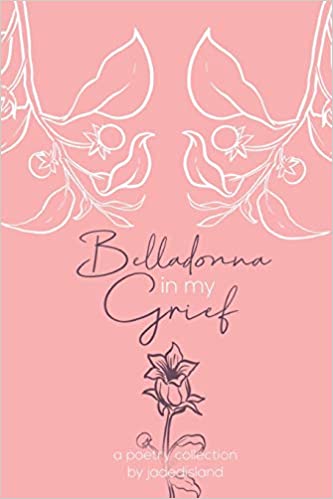
Belladonna in my Grief by Jadedisland
Poems in Belladonna in my Grief by Jadedisland engage the reader in your progressions ranging from grief/distress/loss to healing. It may take you a while to get over it; and you will most probably read several individual passages over again and again. However, it is not easy since it expresses the virtues of Life. Jadedisland's work of imagination and compassion is fair in fascinating her subjects.
Amazon USAPoems in Belladonna in my Grief by Jadedisland engage the reader in your progressions ranging from grief/distress/loss to healing. It may take you a while to get over it; and you will most probably read several individual passages over again and again. However, it is not easy since it expresses the virtues of Life. Jadedisland's work of imagination and compassion is fair in fascinating her subjects.
In The Invisible Climax, the speaker is in pain and reaching towards an end where she doesn’t know what would happen and is truly perplexed about the fact if she is in pain. “On an invisible climax I call success” depicts an uncertain success future for which the speaker is devoted to but she as the fact no one knows the future so it can be stated invisible.
The Invisible Climax
I think I’m in a lot pain yet having no gain
Reaching towards the invisible climax
Only to realize it’s the illusion of what my life is
This is the reality they call corporate biz
I hate it ya know, walking on tip toes
Thinking if I’m careful I’ll be in the know
Despite the fact I’m struggling
Fabulously failing,
Dedicated dying
On an invisible climax I call success
In A Letter to My People, Black People the poet has dedicated the poem to her people (black people). In the very opening, she asks, “Focused on the White man’s pride/Did you forget your own?” reflecting that black people have forgotten their existence in the radiance of white man’s pride. The poet states truth and only truth except for an ironical one, “but we are not just beautiful skin” as they are the most gorgeous creatures ever created by god. Moreover, I see her mentioning some virtues of the black and tries to outbring the beauty of the blacks lost somewhere through her artistic writings.
We are a people,
a heritage that strikes back against hate, and overcomes.
We are more than a token, more than festishized flesh,
we are everything this universe has to offer
in one glorious body.
We are the songs of the cosmos
find pride in your melanin,
find peace in your black soul,
find the fight to keep us as a people whole.
The poem You Asked Where He Was contemplates the reader at ‘him’ as a deep sense concealed in evolves out astoundingly. The people who once had a special interest in her heart are referred to as ‘him’ in the poem. A heartfelt poem it is!
The off-handed unworldliness of Jadedisland —and the astringent exquisiteness of her verbal—is amid our remaining excuses for hope.
--- Rochak Agarwal
